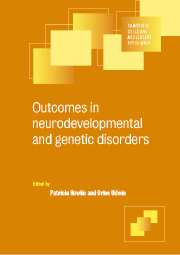Book contents
- Frontmatter
- Contents
- List of contributors
- Preface
- 1 Attention deficit hyperactivity disorder
- 2 Developmental language disorders
- 3 Reading and other specific learning difficulties
- 4 Metabolic disorders
- 5 Hemiplegic cerebral palsy
- 6 Autistic disorders
- 7 Down syndrome
- 8 Fragile X syndrome
- 9 Prader-Willi and Angelman syndromes: from childhood to adult life
- 10 Rett disorder
- 11 Tuberous sclerosis
- 12 Williams and Smith-Magenis syndromes
- Index
Preface
Published online by Cambridge University Press: 13 August 2009
- Frontmatter
- Contents
- List of contributors
- Preface
- 1 Attention deficit hyperactivity disorder
- 2 Developmental language disorders
- 3 Reading and other specific learning difficulties
- 4 Metabolic disorders
- 5 Hemiplegic cerebral palsy
- 6 Autistic disorders
- 7 Down syndrome
- 8 Fragile X syndrome
- 9 Prader-Willi and Angelman syndromes: from childhood to adult life
- 10 Rett disorder
- 11 Tuberous sclerosis
- 12 Williams and Smith-Magenis syndromes
- Index
Summary
Much of the research and the majority of descriptive and clinical accounts related to developmental or early onset genetic disorders have an understandable focus on children. The parents of young children with such conditions have a pressing need to know why the disorder has occurred, whether it can be prevented, what are the genetic implications for other family members, what the long-term outcome is likely to be and perhaps most importantly what they can do to help their child. As time moves on, teachers and others responsible for educational provision need to know what problems these children are likely to face in gaining access to the regular school curriculum and what extra help will be needed in order to meet any special educational needs. And, at every stage, paediatricians, child psychologists and psychiatrists, health visitors, language therapists and many other professionals are likely to be called on for support and advice. It is clearly crucial therefore that those involved in the care, education or therapy of children with developmental and genetic disorders are fully apprised of the nature of the problems with which they have to deal, and of how they can help to minimize difficulties, enhance skills and prevent the development of secondary problems.
However, conditions such as Rett syndrome, fragile X or autism do not suddenly disappear around the age of 16 to 18 years. Neither do problems related to language, specific learning difficulties or attentional deficits cease at these ages.
Information
- Type
- Chapter
- Information
- Outcomes in Neurodevelopmental and Genetic Disorders , pp. ix - xiiPublisher: Cambridge University PressPrint publication year: 2002
